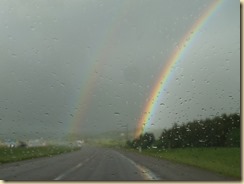Two men go up to the temple to pray. One returns home a new man, justified. The other says a deluded prayer and returns home unchanged. (Luke 18:9ff) What made the difference?
Two sons of a loving father take different paths. One wanders. The other stays home. When the wanderer comes home he is welcomed with open arms and a party is thrown on his behalf; the other sulks in the hallway, bitter and jealous that his hard work goes unnoticed. What made the difference?
I have been struck lately with the absolute necessity of repentance for living life as a Christ-follower. It is not a bitter pill to be avoided but the very provision of God for our Joy! A life of repentance is His design for us as He does the work of transforming us to be like His Son. Without it we are destined to leave prayer unchanged and to be continuous party poopers!
I’m not good at the stuff of repentance. It’s hard on me, because to my mind, repentance has always implied wrongdoing, blame, and guilt–all concepts at odds with being RIGHT, good, and blissfully unaware of guilt. I have resisted admission of culpability all my life. I have tried to be a ‘good’ girl (or at least to look good). Yet in the pursuit of being ‘good’ (isn’t that what parents tell their kids to be?!) I have too often skirted the real road to righteousness, and peace of mind, and JOY.
But God is faithful and He sees to it that I keep bumping into this concept of repentance, not just for the sinner over there, the one I can see and compare myself to with smug result, but the sinner right here in my seat. Repentance is not a one-time ordeal to be gotten over with, but a way of life.
I have too often preferred being ‘right’ to being repentant, being ‘good’ on the outside, to being honest about what’s in my heart.
I have for too long avoided blame as though my life depended on it.
And I can relate far too readily to the Pharisee who stood smugly praying to himself(!): God, I thank you that I am not like other men–I do this, that and the other thing as evidence that I am superior to the common sinner…(Lk.18:11) This is not the way to heart change and growth!
My take on repentance–and here come my excuses–is perhaps due in part to being ‘born in church’ and not having had inclination or opportunity to commit ‘big’ sins (by our church’s measuring stick anyway!) I got in the bad habit of measuring sin by externals rather than the heart. To some extent my poor grasp of repentance is the product of a personality bent on pleasing others and satisfied with externals. But really, I suspect that my resistance to repentance is due to a depraved nature intent on earning the love it needs rather than confessing its unworthiness. Pride is at the core. I have wanted to be right, or at least to appear so. I have seen this as essential to acceptance–God’s and others’. I have been wrong. So once again I am faced with my need to repent, but this time I’m eager to embrace it as a good thing…
I finished Tim Keller’s book on Prayer recently. I appreciated his clarification of a false kind of repentance, what the Bible refers to as ‘worldly grief’ (II Cor.7:10). He points me to a better kind of repentance not fraught with desperate attempts at self-justification! This is not it:
“Legalistic repentance is destructive. In moralistic religion our only hope is to live a life good enough to require God to bless us. Every instance of repentance in this view of things is traumatic and unnatural—because it serves only to (we think) win back God’s favor through our misery. Without a firm grasp of our free justification, we will admit wrongdoing only under great duress, only as a last resort. We will focus on the behavior itself and be blind to the attitudes and self-centeredness behind it. We will also take as little blame as possible, reciting all the mitigating circumstances to ourselves and others. When we do try to repent in this legalistic frame of mind–since we can never be sure if we have been abject enough to merit God’s favor– we can never experience the release and relief of resting in Jesus’ forgiveness.”*
Yes. I know only too well this view of repentance. I have lived it. I want to learn to rest in God’s forgiveness while at the same time being quick to admit my sinfulness. I want to see sin as He sees it and to stop excusing and minimizing its presence in my life. Religiously keeping my own set of rules won’t stop sin’s inroads in my life. These only blind me to its presence. I need to learn a lifestyle of repentance.
True repentance is more opportunity than dread.
More ‘Eureka!’ than ‘Aww rats; I’ve been caught’.
More, “Yes, You’re right Lord!” than ‘But I didn’t mean to..’.
More JOY than ‘If only…’.
This is the kind of repentance I want to learn. There is no truly Christian life without it. God is holy. Man is not. The gulf between necessitates admission of sin and guilt, and faith in the One who willingly paid the debt of sin I owed. This is the very foundation of becoming a Christ-follower. “Repent, for the Kingdom of God is at hand” were Jesus’ own words (Mt.4:17). But repentance doesn’t stop there.
Repentance is essential to spiritual growth. Without it, every other spiritual discipline becomes another opportunity to add ‘Brownie points’ to my self-sustained righteous record. Luther was so bold as to assert that: When our Lord and Master, Jesus Christ, said “Repent”, He called for the entire life of believers to be one of repentance. This is the first of his ninety-five theses that sparked the Reformation. I had never read them till this week. In defense of this statement Luther points not only to Jesus’ command in Matthew 4 but also to His model for prayer– “Our Father in heaven, hallowed be your name…forgive us our debts as we also have forgiven our debtors…”. As God’s children we are forgiven sinners, it is true, but sinners still, living in ‘bodies of death’ with a propensity for sin. This sin would enslave us, destroy our relationships and rob us of joy were it not for repentance.
Repentance is the only sure path to righteousness. I was thinking about the fellow we know as ‘the rich young ruler’ who came to Jesus to find out what he needed to do to obtain eternal life. He had riches. He had a great moral record. But he didn’t have the life Jesus was talking about and he knew it. The outcome of their conversation was the man turning away in great sadness, unwilling to relinquish his love of money for love of God. And Jesus used him as an object lesson to teach his followers how difficult it is for a rich man to enter the Kingdom of God. “It is easier for a camel to go through the eye of a needle than for a rich person to enter the kingdom of God.” (Lk.18:25) His listeners were incredulous: “Then who can be saved?!” Riches won’t do it. Not the riches of dollars and cents or the riches of a fine Christian heritage and moral standard. And I thought, How difficult it is for a self-righteous man to enter the kingdom of God! With men it is impossible but not with God! His kindness leads me back to the Saviour who came not for the righteous, but for sinners (Luke 5:24).
This reminds me of Christ’s rebuke to the Laodicean church: They thought of themselves as rich, successful and in need of nothing. Self-satisfied. But in fact they were wretched, pitiable, poor, blind, and naked. It’s a case of “The Emperor’s New Clothes” revisited. I may not be monetarily rich but if I think of myself as ‘needing nothing’ including repentance! this is a word for me. These first chapters of Revelation are not addressed to the godless who have not yet come to know saving faith. These are messages to the Church. And this one is a call to ‘be zealous and repent.’
But it is a call to repentance driven by love. The God who calls us to repentance has designed us to know rich fellowship with His Son. Our sin prevents this from happening. So He stands at the door waiting for us to invite Him in for tea and fellowship. He waits for us to confess our sins, to be honest with who we are and what we’re up to. He longs to give us what we lack– true riches, His white garments of righteousness and eye salve so that we can see as He sees. (Rev.3:18ff) Repentance is the means to these! It leads to LIFE as we were meant to live it–flawed but forgiven, freed from guilt to celebrate our Father’s love forever. I want this. So I’m asking God to do for me what only He can, to grant repentance in all those areas to which I’m blind and to make me to know truth in my innermost being. (Cf. II Tim.2:25).
Living without repentance is not an option. When I assume I’m faultless (or that my faults are no big deal) I delude only myself. I will never be good enough to live without repentance. I won’t outgrow my need of it this side of glory. But in the meantime it is God’s means for my blessing–for restoration of JOY, of peace, of freedom and of rich relationships with Him and others.
Behold, You desire truth in the inward parts, And in the hidden part You will make me to know wisdom. Ps.51:6
Search me, O God, and know my heart! Try me and know my thoughts! And see if there be any grievous way in me, and lead me in the way everlasting! Ps.139:23-24
–LS
“God, having raised up his servant [Jesus], sent Him to you first, to bless you by turning every one of you from your wickedness.” Acts 3:26
Or do you presume on the riches of his kindness and forbearance and patience, not knowing that God’s kindness is meant to lead you to repentance? Rom.2:4
Blessed is the man against whom the LORD counts no iniquity, and in whose spirit there is no deceit. Ps.32:2
“Restore to me the joy or your salvation, and uphold me with a willing spirit.” Ps.51:12
Truly no man can ransom another, or give to God the price of his life, for the ransom of their life is costly and can never suffice, that he should live on forever and never see the pit. Ps.49:7-9
“The sacrifices of God are a broken spirit; a broken and contrite heart O God, you will not despise.” Ps.51:17
_______________
I commend to you a closer look at these stories of repentance…
–David’s story– Psalm 51 [Historical Context: II Samuel 11, 12]
–The Prodigal and his elder brother–Luke 15
–Paul’s story: Acts 9 and 26; Philippians 3
–And don’t forget Luke 18…the parable of the Pharisee and the Tax Collector and the story of the rich young ruler…
*See Timothy Keller’s PRAYER: Experiencing Awe and Intimacy with God.
Dutton, 2014. p.210.





